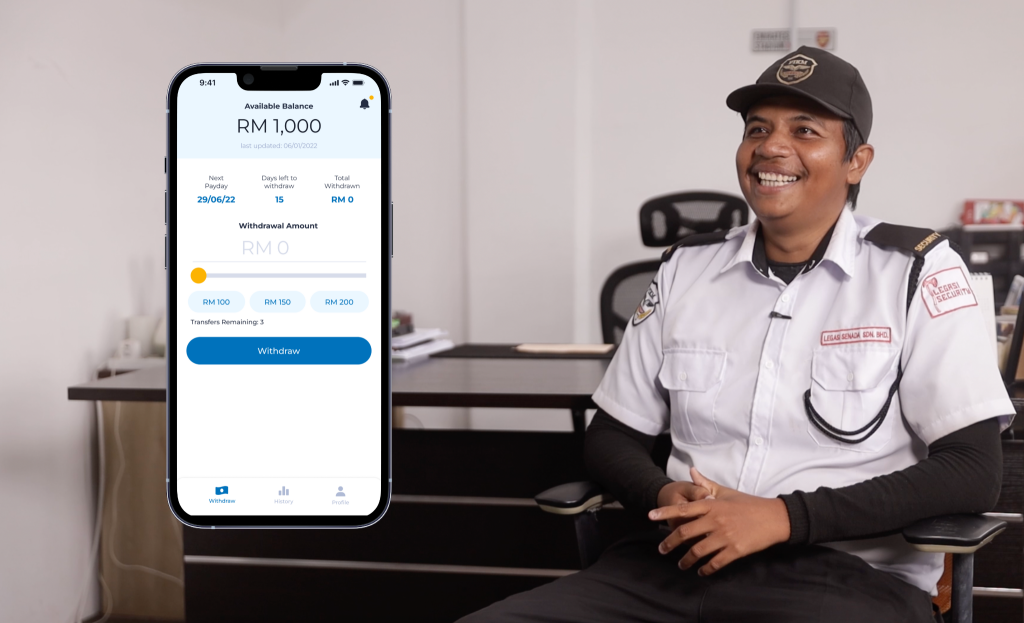By Muhammad Rezza Bin Zulkifli
The world of work plays a very vital role in a person’s mental health — many of us spend most of our daily hours at our workplaces, and our work lives can affect our behaviour and emotions even at home. As an employer, I believe that keeping employees emotionally healthy does not stop at their workload and personal development; it also extends to giving them the flexibility to manage their salaries in a way that works best for their individual needs.
Only with a healthy workforce can we construct an environment where staff and workers can reach their full potential and make truly significant contributions. In order to provide people with easy access to their finances, various types of financial solutions have emerged. Chief among them is earned wage access (EWA).
The concept of EWA is actually a simple one: giving employees immediate access to the salary they have earned, rather than having them wait for paycheck week. With the rise in cost of living, timely access to finances and salaries have become more vital than ever. As the competition to hire and retain employees grows ever more important, EWA can make a big difference in attracting the right people to help one’s business to scale and meet customer expectations.
Despite this financial flexibility, many working Malaysians (employers included!) are still hesitant in adopting the concept and still view it as a debt trap, unaware of its far-reaching positive effects and the solutions it presents.
Money matters ahead
To illustrate the full positive impact that EWA can have on the workforce, we first need to look at a common problem that plagues many businesses: cash flow issues.
With more people feeling the effects of the high cost of living, more employees are likely to request for advance payouts or alternative salary arrangements. At Legasi Senada, we have also experienced this — the administrative burden of managing advances and payouts at different intervals became too time-consuming a task. Having to accommodate this and balance our monthly business costs also caused cash flow issues to arise more frequently.
Where there is not enough money coming in, employers will soon find themselves facing other kinds of difficulties: high turnover rates. Employees may turn elsewhere for a position that meets their financial needs, forcing companies to fork out extra costs to re-hire. Made worse by the rising costs of living, this also affects morale and the sense of security for employees who remain.
To resolve this problem, some even resort to borrowing from loved ones. When approached sensibly, borrowing money from family can prove to be a viable and straightforward option. However, there are times when this arrangement can end up serving neither party well and even lead to strained or severed relationships.
The financial flexibility of EWA
With services becoming more digitised, EWA platforms are also emerging as a popular way to provide employees with financial flexibility. For example, via the Payd app that we have implemented to facilitate our financial transactions and payroll processes, our Legasi Senada employees will be able to log in to the app as and when they want to withdraw a certain percentage of their pay.
Through this method, employees will only be accessing money that they have already earned, avoiding the payday loan trap. In freeing workers up from the traditional pay cycle, it would put an end to the predatory lending models that have disrupted numerous families in the past, and avoid the risk of accumulating any debt.
Beyond the early access to income advantage, the concept also provides employees with greater autonomy over their finances. Employees who are free to make their own choices about how they go about their responsibilities are happier, more committed, more productive and more loyal than those whose every action is prescribed.
Enabling a sense of engagement with their work and organisation, the employee will be able to maintain their pride and dignity without having to submit to a cycle of borrowing and repaying. In doing so, it produces employees that are happy and more financially secure and knowledgeable about their spending.
EWA provides management and employers an easier avenue to maintain satisfaction levels, resulting in increased productivity and reduced absenteeism. The benefit also extends to employers, taking the administrative burden of dealing with manual advance pay requests off human resource personnel, as the pay-on-demand solution can be integrated on a single platform like the Payd app.
Moreover, having an earned wage access avenue within an organisation system would heavily support recruitment efforts and allows companies to both attract and retain quality talent. It demonstrates that the company cares for its employees as individuals outside of work, a form of support and flexibility that we feel the modern workforce genuinely appreciates.
Encompassing a wide range of benefits, EWA is moving traditional payroll processes in a more human direction, centering itself around the working patterns and very real lives of employees.
Nipping the harmful payday lending market in the bud, this rising trend will ultimately save employees from the downward spiral of loan fees, high interest rates, or even seizure of collaterals — ultimately improving the financial and mental health of workforces for the better
Muhammad Rezza Zulkifli is the armed manager at Legasi Senada Sdn Bhd























